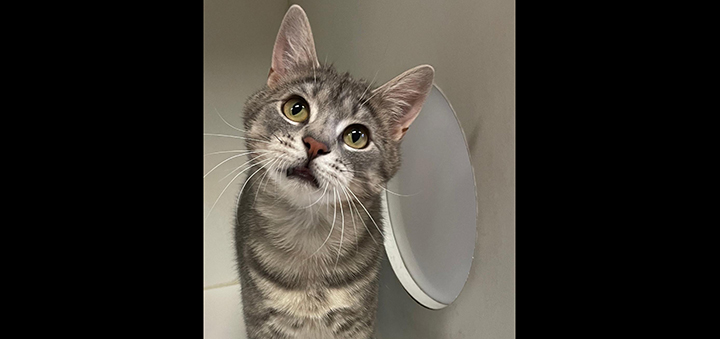Chenango SPCA: Does Outside Mean Stray?
Published:
April 16th, 2024
 Gavin, a 2-year-old kitty at the Chenango SPCA, is curious why no one has adopted him. (Submitted photo)
Gavin, a 2-year-old kitty at the Chenango SPCA, is curious why no one has adopted him. (Submitted photo)
By Patrick McLaughlin,
SPCA Executive Director
From the time I was about six until I was off at college, my family had a black cat named Midnight. For most of that time, he was our only pet. Midnight was a strictly indoor cat.
At least, he was a strictly indoor cat from our perspective. He was never sold on the idea. My siblings and I grew up in a household where everyone had to be attentive to the doors. After a while, it was natural for us to just know that you had to open and close outside doors as quickly as possible, and be on the lookout for a small black blur running toward the outside world.
Despite our efforts, there were times when Midnight's urge to get outside, and his black-cat cunning, were too much for us. Not often--maybe a handful of times over the course of nearly 15 years--he did manage to escape. Since he was an indoor cat, he didn't have much idea what to do once he made it outside, and he usually stayed very close to our home.
Thankfully, on those few occasions when he did get out, it usually didn't take long to find him, and he always seemed quite happy to be scooped up and brought back to the familiarity of the home that he had only just run away from.
When Midnight did manage to get outside, he was only ever out there for, at most, a few hours before we found him. Thankfully, it was always one of us who found him. After all, we knew that he was our cat and that he had gotten lost. What would a stranger think?
To put that another way, consider a different question: During the few hours when Midnight was outside, would it be correct to call him a "stray cat"? Since you already know that he had a family and a home, you probably think that the answer is a resounding no. He wasn't a stray cat, he was a lost cat.
As it turns out, that distinction makes a big difference. If you see a cat near your home and assume that it's lost, you'll be more likely to try and find its owners and reunite them. On the other hand, if you assume it's a stray cat, you'll be inclined either to leave it alone or bring it to a shelter like the Chenango SPCA.
Over the next few weeks, I'll be sharing thoughts focused on cats and how best to take care of them. For this week, I only want to point out that the choice to assume that a cat is "stray" rather than "lost" has some real consequences: Unfortunately, bringing a cat to a shelter (not just the Chenango SPCA but pretty much any shelter) actually decreases the chance that that cat will ever be reunited with its owner.
Most cats who come to a shelter have no identification, so there's no way for us to contact an owner. Unfortunately, most owners of lost cats don't reach out to their local shelter. If they do, it's usually after they've waited (often several days) to see if the cat comes home. Often, if the owner reaches out at all, it happens after the cat has already been adopted to another family.
Much like Midnight, most cats who have an indoor home will come back to it on their own. Bringing them to a shelter makes that impossible. Yes, we will take care of it and adopt it into another good home, but it would be even better for every lost cat to go back to the people who love it and miss it.
How would assuming that a cat is lost, rather than stray, change your reaction? Would you be more likely to post signs to let people know you've found a lost cat? Would you be more likely to knock on your neighbors' doors to see if their pet cat is missing? Would you be more likely to leave it alone--for now--and keep an eye out for it in the future? All of those things are actually better for healthy cats than immediately bringing them to a shelter.
Although this can be counter-intuitive, the best research we have says that a cat who happens to be outdoors is probably okay, as long is seems healthy, well-fed, and un-injured.
In the coming weeks, we'll take a closer look at the different kinds of cats we might find outdoors and how best to respond to them. With "kitten season" approaching, we'll also take a look at the best way to respond when you find kittens. Stay tuned! In the meantime, consider also reading this article from the Humane Society of the United States about the difference between "lost" and "stray" animals.
Visiting hours the SPCA in Norwich are Tuesday from 12 p.m. to 7 p.m and Wednesday, Friday, and Saturday from 12 p.m. to 4:30 p.m. Call 607-334-9724 or visit cspcainfo@chenangospca.org for more information.
Consider adopting a furry friend today!
Comments








